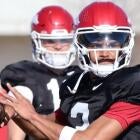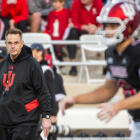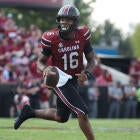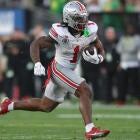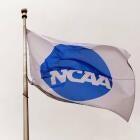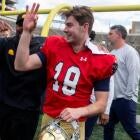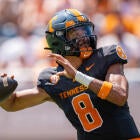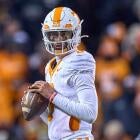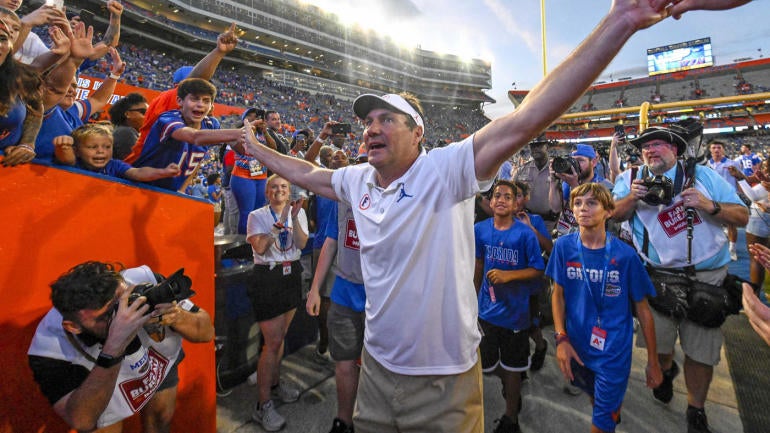
GAINESVILLE, Fla. – One of the nation's best tight end prospects strolled through the lobby of Florida's Heavener Football Complex on Friday before the Auburn game. The big, strapping recruit looked like he'd been in the NFL for 10 years. No names, please, because the NCAA doesn't allow coaches publicly acknowledging individual recruits until they're signed to National Letters of Intent.
"We probably had 200 of the best players in the country here today," Florida football coach Dan Mullen said gleefully of the visiting recruits who watched the first top-10 game in The Swamp since 2012.
Florida's recruiting effort last weekend didn't stop there. About 2 ½ hours before the Gators kicked off Saturday, a Florida state representative submitted a bill that aims to provide name, image and likeness rights to college athletes, something that could benefit Florida, Florida State, Miami, UCF and plenty of other Sunshine State universities in the near future.
Similar to the law passed in California, those athletes would have the ability to profit off such things as autographs, endorsements and commercials. That is potentially one hell of a recruiting advantage.
The biggest difference? The Florida bill could become law in a mere 6 ½ months on July 1, 2020. The California law doesn't go into effect until January 2023. Similar bills are pending in at least 11 states.
Florida and California just happen to be No. 1 and No. 3 in terms of the states the produce the most FBS recruits annually. Long before the name, image and likeness issue is cleared up, coaches in those states can recruit to the possibility of legal riches beyond that of other states.
"Something is going to change," Mullen said.
While Mullen isn't sure what recruiting tactic he'll take, the thought has crossed his mind. He had athletes on campus Saturday from the next four recruiting classes (2020-23).
"That's something you'd get into in December and January in home visits sitting down with kids," Mullen said.
Coaches will recruit to anything -- from playing time to the male-to-female ratio on campus, right down to flavors of ice cream available at the training table.
The right for a player to earn money off their likeness seems to be a no-brainer.
"Will a coach potentially recruit a student-athlete in the future and say, 'Hey, this former athlete who was here was able to make X amount of dollars when he was here?'" said Darren Heitner, a South Florida lawyer who helped write the Florida bill. "Sure, but what's wrong with that?"
Heitner is a Florida graduate whose firm works with athletes. He specializes in sports entertainment law and intellectual property.
"It's not the government's job to be involved in recruiting," he added. "There is certainly no intention to provide a school with a competitive advantage. But in the world of recruiting, schools will use the success record of the institution, the history of the coach, the massive amount of money that has been spent on facilities."
Why not potential name, image and likeness earnings?
"Everyone is going to do what they want to do," said a Gators source. "What we gotta do is, how do we use this to our advantage?"
Name, image and likeness has been the No. 1 off-the-field issue this season. The NCAA has controlled those rights for years. Athletes basically forfeit them when they sign their letters of intent.
As it stands, NCAA athletes are limited to room, board, books, tuition and cost of attendance. The NCAA prohibits its athletes from compensation based off their success and humanity. For decades, the likes of Barry Sanders sold Buicks, whether he liked it or not. His highlights were used in promotions sanctioned by the NCAA.
In more modern times, football players bring their uniforms to preseason media days. They are commanded to suit up in a hotel suite while a rightsholding network shoot promos for the upcoming season.
This ESPN "College GameDay" promo, for example, features highlights of players from at least 23 FBS schools. That's almost one-fifth of the major college schools in 2 minutes.
They are not compensated for their time or image.
"We're trying to provide the student-athlete with the same right every other American has," Heitner said. "We are not getting involved whatsoever with regard to whether colleges are going to pay players."
The Florida bill would also allow athletes to have agent representation. It would not allow athletes to enter into any agreements with school sponsors. (Example: They could not get an endorsement deal with the big three apparel giants of Nike, Adidas and Under Armour.)
"I'm not sure the casual football fan or the high school player follows this to the same degree we do," said Barton Simmons, the director of scouting for 247Sports, a CBS Sports affiliate. "But, absolutely, if the education [of these rights] takes place, there could be a recruiting advantage."
What has emerged among NCAA schools is anything but a consensus against granting those rights. While the NCAA and California seem poised for a legal face-off, those calling for increased athlete rights elsewhere seems to be growing.
Duke basketball coach Mike Krzyzewski made headlines Tuesday when he said the California bill, "… pushes the envelope, it pushes the issue. We've had our head in the sand a lot for college. We're not good game planners for the future. We're reactionary."
Stanford football coach David Shaw is considered one of college athletics' most well-read thought leaders. His program would be directly impacted if a compromise isn't reached before 2023.
The NCAA has said the bill, when implemented, will result in California schools being declared ineligible for championships because of an unfair recruiting advantage.
"My take on the NCAA is that it has to grow and change," Shaw said on SiriusXM radio. "It's not easy. There's a lot of things to factor in. There are a lot of things that people outside the world of college athletics don't completely understand."
Michigan football coach Jim Harbaugh said this week that he "wouldn't be against" athletes being granted these rights. He proposed cutting football scholarships in half (from 85 to 42). Players would be paid the scholarship plus an additional $100,000.
"If you did that across all sports, that budget could stay the same and be financially feasible," Harbaugh said.
A wave of conference commissioners spoke out against name, image and likeness rights this week. Big 12 commissioner Bob Bowlsby is a member of the NCAA's working group due to come up with recommendations on how to proceed with this issue by the end of the month.
"This is going to spread to other states. It already has," said one Power Five athletic director who wanted to remain anonymous. "What I'm hoping is we can get some consensus nationally as to what it is. The college model will continue on. … There is going to be college athletics in the future. Is it going to look the same as it does today? It never has. It's constantly changed."
As for the athletes, the discussion sometimes seems so far away -- until you consider coaches will recruit to almost anything. That would include the star tight end who walked through the Florida football facility last week.
"Boy, we throw the ball to the tight end a lot," said Mullen with a smile after Saturday's game.
![[object Object] Logo](https://sportshub.cbsistatic.com/i/2020/04/22/e9ceb731-8b3f-4c60-98fe-090ab66a2997/screen-shot-2020-04-22-at-11-04-56-am.png)








